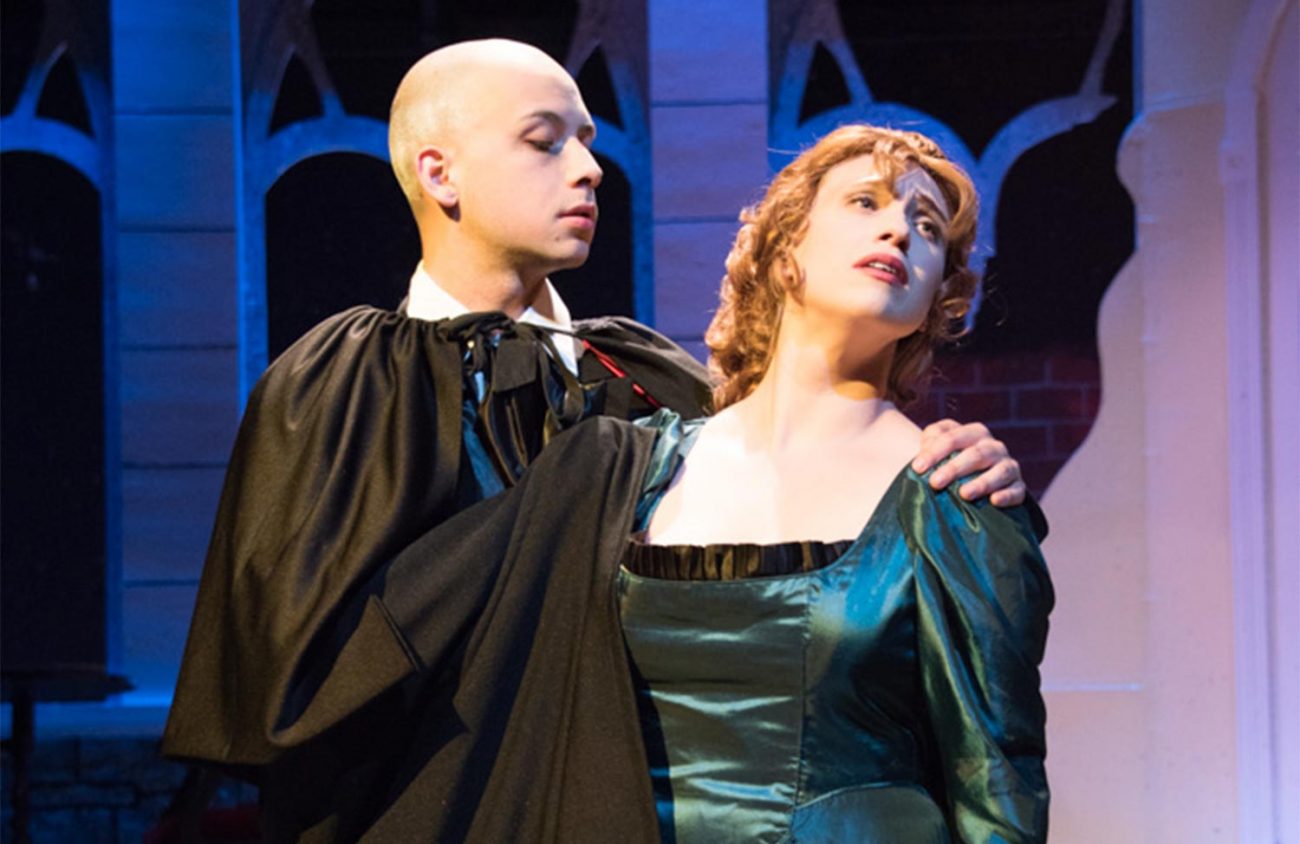Steven Dietz’s 1996 adaptation of Dracula maintains a disorienting fidelity to Bram Stoker’s 1897 novel, hewing close to the spirit and characterization of the original.
Disorienting because, over time, the rich symbolism of the vampire has been freighted with the weight of endless interpretations, with the bloodsucker standing in for everything from the wages of addiction and erotic enslavement to ideological possession, embezzled immortality and the capitalist theft of souls.
In Very Little Theatre’s production of Dracula, sharply directed by Stanley Coleman, we get the straight stuff — a gothic, Slavic vampire at the dawn of the industrial age, whose very presence is a cosmic rebuke to the Enlightenment itself, which falsely pitted science and progress against the dictates of tradition and religion.
The horrors of Dracula are the distinctly Nietzschean and nihilistic horrors unleashed by our modern age, and VLT’s production mines those horrors admirably. It’s nice to see the story stripped back to its post-Romantic roots — good, evil, life, death. That’s the good stuff.
As Dracula, Joel Ibáñez is fantastic. He plays the dreaded count as an imperiled tyrant whose very weakness makes him terrifying. Dracula’s immortality is contingent not just on blood, but on maintaining connection to his Transylvanian soil, and Ibáñez injects his performance with a desperation and pathos that bring out the monstrous humanity of Stoker’s creation. Dracula’s evil is the evil of need, all else be damned, literally.
And around this blood-sucking narcissist revolves a constellation of now-legendary characters: Dracula’s obsession, Lucy (the wonderful Melanie Moser) and her friend Mina (Aimee Hamilton); their love interests, Seward (Robert Williams) and Harker (Kyle Letsom), who makes first contact with the fiend as he travels abroad on business; and Van Helsing (Adam Leonard), the philosopher — part scientist, part spiritualist — brought in to defend them all against the vampire’s assault.
This is a strong cast, but one actor in particular deserves special mention: As the insane, bug-eating, vampire-worshipping Renfield, Blake Beardsley is by turns charismatic and repulsive, and completely mesmerizing. Beardsley’s performance walks the razor’s edge between abject submission and enraged rebellion, thereby capturing the tragicomic dilemma of Renfield’s role — a cipher for the paralysis of a fragile human being confronting pure, unadulterated evil. In some terrifying way, Renfield is us.
At the heart of Stoker’s novel, and salvaged by Dietz’s adaptation, is a stunning inversion of the Christian mythos, which is at once tragic and beautiful and a bit creepy: If Jesus shed his blood for our sins, ensuring salvation and eternal life, Dracula perfectly reverses the flow, feeding on our blood to save his own sorry ass. This is why vampires shrink in the face of a crucifix — it’s like waving The Communist Manifesto in the face of a CEO. Which only works if you mean it. That’s the rub.
We moderns, smug in our apparent dispensing of the whole faith-in-God thing, have thrown the baby out with the bathwater, replacing religious faith with an untoward confidence in our own intellectual prowess and the forces of science, logic and rationalism, as though the two were mutually exclusive. And now we’re being ruled by evangelical Christians, who have inverted and perverted their religion in truly abominable ways, and we’re all eating bugs and screaming from cells of solitude while they … you see where this is going. Boo!
In a sense, then, VLT’s production rescues Dracula from the vampirism of endless commodification, placing it back firmly at the center of an ages-old conundrum that fuels all great horror, and which we ignore at our existential peril. It’s telling that Van Helsing, the vampire slayer, is at once a man of science and a man of faith, thereby embodying an overcoming of the Enlightenment divide. It’s not his faith that matters; it’s just that he has some, which allows him to act, regardless of the consequences for his own life.
In Dracula, as with all great horror stories, what scares us is not necessarily the evil that arises — whether killer shark or mad slasher or blood-borne infection — but whether it will be dealt with. That’s what terrifies us: Our own capacity to oppose evil. All horror is, at bottom, a cautionary fable.
And, alas, woe to you who think there’s nothing at stake in all of this. — Rick Levin
Dracula continues through Nov. 10 at Very Little Theatre; $17-$21, tickets at TheVLT.com or 541-344-7751.
